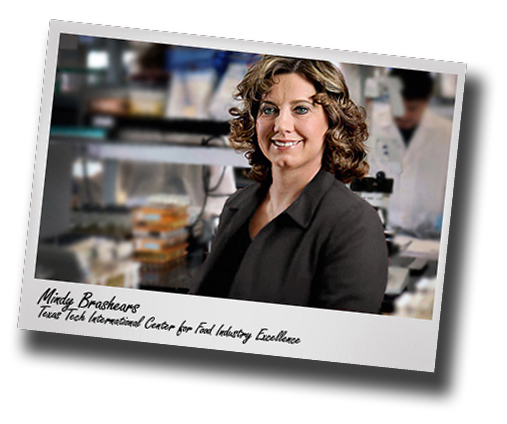Food Safety; AFS's ICFIE program adapts to environment, needs of society
In 1996, the World Food Conference defined food security as existing only when all people, at all times, have access to safe and nutritious food. Worldwide, the United Nations estimates that two billion people and nearly 200 million children under five years old suffer from under nutrition, with more than 3.5 million children dying from under nutrition each year.

Public health concerns also are prevalent, even in countries where food is plentiful. The Centers for Disease Control estimate that 48 million cases and more than 3,000 deaths occur in the United States annually due to foodborne illness. In Mexico, foodborne illness is the leading cause of death in children younger than 5-years-old. Working with government agencies, universities and development agencies across the U.S., Central America, the Caribbean and Europe, Tech researchers are assisting in the development of food production and safety practices and public health education.
Also, researchers are looking at the spread of emerging diseases from domestic animals and wildlife to humans. With the addition of a biological safety level three laboratory, Tech scientists have the ability to perform both basic and applied research related to biological agents and toxins which have the potential to impact human and animal health.
Texas Tech, working primarily through the International Center for Food Industry Excellence and The Institute of Environmental and Human Health, is leading interdisciplinary efforts in a number of food security and food safety areas including:" Using a farm to fork approach to reduce foodborne pathogens such as E. coli and salmonella" Working to preserve the efficacy of antimicrobial drugs for future generations by mitigating antimicrobial resistance in bacteria carried in food producing animals" Working with developing countries to create sustainable food sources, improve public health education and increase economic value" Examining how contaminants may affect the food chain" Disrupting the cycle of disease transmission from animals to humans
The research, outreach and education activities of the International Center for Food Industry Excellence (ICFIE) adapts to the environment and the needs of society. In addition to focusing on disease-causing bacteria in food, the team also focuses on people. In particular, much effort is focused on understanding the food safety culture of workers in food production environments, a critical issue as attitudes toward food safety affect the likelihood of effective and sustained behavior change.
In Honduras, ICFIE is working with the government to utilize local resources to feed cattle as a sustainability project to increase both the economic value and the amount of meat available to the people of Honduras. The project also puts an emphasis on public education in food safety.
In the Bahamas the team is working with the government to develop a new agriculture school by providing goats, lambs and embryos of each; teaching artificial insemination techniques and food safety. The team also is assisting in developing new food products and there are plans to help build a new slaughter plant.
Tech students are working in a French food safety lab on novel, cutting-edge molecular work to understand E. coli and salmonella. ICFIE also has a relationship with the Roslin Institute in Scotland to better understand the molecular aspects of how salmonella interacts with its host.
Through the Sustaining Our World through Education and Research (SOWER) scholars program, interns and graduate students from developing countries come to Texas Tech to learn the skills needed to help their countries. The students are then expected to return home to apply the knowledge they've gained at Texas Tech to develop and strengthen food resources and improve public food safety education.
The ICFIE team's public health efforts also focus on reducing cases of E. coli, salmonella and listeria, another foodborne illness as well as looking at implications of antimicrobial resistance.
E. coli bacteria are transferred through undercooked beef products, unpasteurized dairy and food, such as produce, that may be contaminated with animal feces. Researchers are working to understand the practices and interventions that may be associated with how this pathogen survives in animals and in food production systems. They have evaluated and developed several interventions that are commonly used today by the food production industry, such as probiotics, vaccines and non-thermal microwave technology.
With more than a decade of experience working on salmonella, researchers have recently reported that salmonella can be harbored within peripheral lymph nodes of cattle, which may pose a threat to consumers. Texas Tech was the lead institution on the first competitive award from USDA/NIFA to understand this phenomenon in cattle populations and is now focused on reducing the threat to human health.
Written by Sally Post
CONTACT: Mindy Brashears, Professor of Food Microbiology, Food Safety; and Director of the International Center for Food Industry Excellence, Department of Animal and Food Sciences, Texas Tech University at (806) 834-4274 or mindy.brashears@ttu.edu
0202NM15 / Editor's Note: For full of the article, go to the Office of the Vice President for Research's Texas Tech Discoveries Newsletter at http://www.depts.ttu.edu/vpr/news/downloads/Food-safety-security.pdf
Davis College NewsCenter
-
Address
P.O. Box 42123, Lubbock, Texas 79409-2123, Dean's Office Location:Goddard Building, Room 108 -
Phone
(806)742-2808 -
Email
kris.allen@ttu.edu
